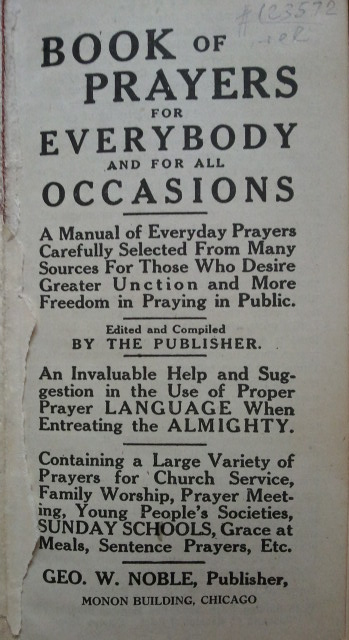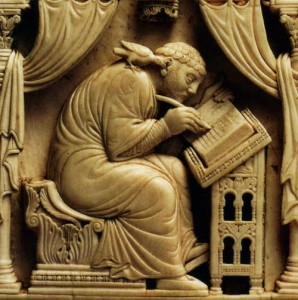Archive for September 28, 2013
The mysterious life of G. W. Noble
I’m drawn to old books with extravagant titles–especially those with long, descriptive sub-titles–and yesterday a small, exuberant book with a red cover caught my eye at the book store. I see in these extended book titles the expression of the author’s hopes and intentions for the work, paired with a bit salesmanship. You can’t always judge a book by its cover, but the title will reveal a lot.
I wondered what I would find inside a book with such an audacious title, and the Book of Prayers for Everybody and All Occasions did not disappoint. I opened it and read:
“A Manual of Everyday Prayers Carefully Selected From Many Sources For Those Who Desire Greater Unction and More Freedom in Praying in Public….An Invaluable Help and Suggestion in the Use of Proper Prayer LANGUAGE When Entreating the ALMIGHTY….”

Isn’t that wonderful? Who wouldn’t desire greater unction and more freedom when faced with the terrifying prospect of praying in public? And in such a small book! I turned the page.
The prayers in this work were edited and compiled by the publisher, George W. Noble. In his introduction Noble explains his purpose:
In the preparation of this work the aim has been to supply a long-felt want as to helps in the important ministration of public prayer. It is not always true, as some people suppose, that if persons have divine grace in their hearts, they will pray fluently and powerfully. In religion, as in other things, “practice makes perfect;” and many an earnest Christian has not had the opportunity of exercising his gift, grace and usefulness in the public service of the Master. A Common Mistake:- Many have supposed that because they can talk well among friends, therefore they can pray well in public. Such an idea is liable to lead him who entertains it into serious embarrassment sooner or later, and it don’t mend matters to have some of the dear members tell us we need more religion—they were mistaken. What we needed was something like this Book to suggest to us kindly how we should pray. The Remedy: – Somebody who knows the right direction in prayer should go ahead and make plain the way. This is what this Book offers to do, for everybody and for nearly every conceivable occasion connected with the Lord’s work. How to Use It:- Read it! Read it often! Read it carefully! Read it prayerfully! Let each prayer make its due impression on your own heart. Pump your heart full of it–not the words necessarily, but the thoughts. Master the thoughts, and the words generally will take care of themselves. The work is submitted to the Christian public of all Denominations, believing that its frequent use can only be conducive of good results. It seems hardly necessary to add that the most fluent address to the Almighty in prayer without His grace in the heart would be like “sounding brass or a tinkling cymbal,” and exceedingly offensive to Him. With the aid of the Holy Spirit, and rightly using this little Book, it is confidently believed that no one who names the name of Jesus should be unable to offer public prayer whenever and wherever in duty they are called upon; and may many find in this Book a more ready access to the Throne of Grace.
Copyright 1907 by G.W.NOBLE, Publisher, Chicago.
Cloth Binding. Price, 25c. Red Morocco Binding, 35c.
Postpaid on Receipt of Price. Stamps Taken.
By the time I finished reading the preface, I was utterly charmed and wanted to know more about this man who exhorted the Christian public to “…Let each prayer make its due impression on your own heart. Pump your heart full of it…”
But despite my best searching, I haven’t discovered much. I know that in the early 1900s, George W. Noble published a series of religious works in this small format with red binding.
Some interesting titles I’ve identified are:
The Sword of the Spirit Which is the Word of God; Complete Help to Personal Work, Quick Answers to Excuses and All the Great Questions of Life, Duty and Destiny. 1900
Picture Puzzles or how to Read the Bible By Symbols: Designed Especially For The Boys and Girls to Stimulate a Greater Interest in the Holy Bible, 1903
Book of 625 New Bible Stories And Illustrations Also Scripture Incidents And Anecdotes, 1905
Book of 750 Bible and Gospel Studies, 1909
Book of Points for Christians and Personal Workers: Objections and Excuses Fully Answered; Bible Doctrines Simplified.
A few breadcrumbs on the internet trail suggest that “personal work” refers to evangelism and that Noble’s publications may have been associated with the Restoration Movement. The company’s office was probably on Dearborn Street in Chicago, in a building designed by the well-known Chicago architect John Mills Van Osdel.
And that’s all I know. In this case, the titles of his books really do tell us as much about the man as any other source. They reveal a desire to make the Bible accessible and interesting, and a plan to equip others for sharing their Christian faith. Ambitious goals, and all in easy-to-carry pocket-sized books, so you’ll be ready whenever and wherever in duty you are called.
Touching joy
…the essence of our nature is to touch
the joy from which creation comes.
From “Ordinary Love” by eraquinas (Aquinas Woodworth)
via NextScribe
Making the Sign of the Cross
For the most part, The Church is only now beginning to explore and understand the importance of the world wide web for ministry, hospitality, and outreach. One of the early pioneers of online ministry is the Rev. Matthew J. Moretz, an Episcopal priest and creator of “Father Matthew Presents,” a series of light-hearted and informative video blogs begun in 2006.
Crossing oneself is a prayer for some, a reflex for others, and a superstitious gesture to many outside the tradition. It often appears in movies as shorthand for “this person believes in God” or “this person is reverting to their childhood belief” or “this person is really afraid.” No wonder that the video is one of the most frequently viewed on Father Matthew’s YouTube channel.
Betrayed by the Church
It is not an enemy who taunts me—
then I could bear it;
it is not an adversary who deals insolently with me—
then I could hide from him.
But it is you, my equal,
my companion, my familiar friend.
We used to hold sweet converse together;
within God’s house we walked in fellowship.
Psalm 55:12-14
Some indeed preach Christ from envy and rivalry, but others from good will. The latter do it out of love, knowing that I am put here for the defense of the gospel; the former proclaim Christ out of partisanship, not sincerely but thinking to afflict me in my imprisonment. What then? Only that in every way, whether in pretense or in truth, Christ is proclaimed; and in that I rejoice.
The Church will make you crazy. Really. She’ll break your heart. If you care deeply about the the Church–or any particular congregation–there’s a good chance that someday you will pull out your hair and say in astonishment, “I can’t believe this is happening in a church!”
I’m not saying that Christians are naive. We know what people are like and we know what they’re capable of, and out in the world that knowledge is armor from the slings and arrows and plain stupidity and meanness that come our way. But at church… At church, we were hoping for better; hoping to see the good that people are capable of strengthened and motivated by love for God and neighbor; hoping to be part of a community–working out our differences, striving to do God’s will. That’s what we’re hoping…
…and then one day something happens, and it all looks like just another power struggle and a pack of lies.
It’s especially painful and damaging when the people behaving badly are clergy.
“I thought you were going to help me to learn about God, and this is what you show me!? This is what He’s like?!”
It feels like betrayal, like moral injury–which is why it’s so damaging and why the damage is long-lasting. And unfortunately we’re not always clear on who’s betrayed us–the clergy person or God? When that happens, people don’t just switch churches, they leave The Church. They lose their faith, or get disgusted by it and throw it away.
A lot of dear, loving Christians have been deeply hurt by the Church. Truth to tell, a lot of ministers and priests have been deeply hurt too. Not just upset because they didn’t get their way, but wounded and scarred, betrayed and abandoned. It’s not something Christians talk about much. It’s ugly and difficult. And even if it’s not a newsworthy scandal, people within the power structure of the institutional Church will sometimes protect their own or ignore the problem. Do damage control. Circle the wagons. Obfuscate. Think, “If we wait long enough, the problem will go away.” Because, at times, the Church behaves just like the police, the military, government, schools, and business–constructing its defenses so tightly that even the Holy Spirit would have trouble getting in.
And yet, Christ loves the Church. And forgave us. All of us. From the Cross. And somehow, he uses this crazy, flawed, sinful group of people to proclaim his gospel. It’s really quite astonishing. You think he’d find some better tools.
Perhaps we need to talk more about the injuries we suffer, and those we visit upon one another. Perhaps that would bring greater healing and forgiveness, and perhaps some repentance and reform. I don’t know. But I know that Christ suffered betrayal and did not give up on us. Perhaps that’s the place to start.
“The challenge is to forgive the Church. This challenge is especially great because the Church seldom asks us for forgiveness, at least not officially. But the Church as an often fallible human organization, needs our forgiveness, while the Church as the living Christ among us continues to offer us forgiveness.”
–Henri Nouwen, Bread for the Journey, October 27.
Mind the gap: words and deeds
Psalm 148
Praise the Lord!
Praise the Lord from the heavens,
praise him in the heights!
Praise him, all his angels,
praise him, all his host!
Praise him, sun and moon,
praise him, all you shining stars!
Praise him, you highest heavens,
and you waters above the heavens!
Let them praise the name of the Lord!
For he commanded and they were created.
And he established them for ever and ever;
he fixed their bounds which cannot be passed.
Praise the Lord from the earth,
you sea monsters and all deeps,
fire and hail, snow and frost,
stormy wind fulfilling his command! …
It’s been a very full summer and I’m afraid I haven’t been able to write as often as I would have liked. This morning I have just one quick thought from reading Psalm 148. It’s a great rush of a psalm, and I really enjoy the spirit of exhortation that brings all creation into a mighty chorus of praise. Planets and sea monsters, fire and hail, and everyone from Kings to children come together. What an image! And as I read, I was struck by the words, “For he commanded and they were created” and “stormy wind fulfilling his command!” That word, “command.” The psalmist says that we should praise God because he speaks a command and it happens. God’s words (however it is that words come out of the mouth of God) are enough. He has authority.
As I mused a bit, this reminded me of the stories of the Centurion’s servant in Matthew 8, and of Jesus calming the winds and the sea–also, and perhaps not coincidentally, in Matthew 8. They echo this idea of authority:
As he entered Caper′na-um, a centurion came forward to him, beseeching him and saying, “Lord, my servant is lying paralyzed at home, in terrible distress.” And he said to him, “I will come and heal him.” But the centurion answered him, “Lord, I am not worthy to have you come under my roof; but only say the word, and my servant will be healed. For I am a man under authority, with soldiers under me; and I say to one, ‘Go,’ and he goes, and to another, ‘Come,’ and he comes, and to my slave, ‘Do this,’ and he does it.” When Jesus heard him, he marveled, and said to those who followed him, “Truly, I say to you, not even in Israel have I found such faith. I tell you, many will come from east and west and sit at table with Abraham, Isaac, and Jacob in the kingdom of heaven, while the sons of the kingdom will be thrown into the outer darkness; there men will weep and gnash their teeth.” And to the centurion Jesus said, “Go; be it done for you as you have believed.” And the servant was healed at that very moment….
…”“Why are you afraid, O men of little faith?” Then he rose and rebuked the winds and the sea; and there was a great calm. And the men marveled, saying, “What sort of man is this, that even winds and sea obey him?”
We struggle in this earthly life with the gap between words and deeds. We command, and nothing happens. That schoolyard taunt, “You can’t make me!” will come back again and again–at work, at home, even between nations. And the truth is, we cannot even make ourselves do the good that we will (Romans 7:19). No wonder the psalmist is amazed.
The Monks’ Complaints and Delights
Be it a job or a vocation, sometimes even holy people complain–especially when the hours are long and the work is tedious.
Here’s a collection of complaints and comments written by monks in the margins of medieval illuminated manuscripts. They’re presented by Maria Popova on her site Brain Pickings.
Click here to open in another window and read gems such as:
“New parchment, bad ink; I say nothing more.”
“Oh, my hand.”
“As the horbor is welcome to the sailor, so is the last line to the scribe.” and
“While I wrote I froze, and what I could not write by the beams of the sun I finished by candlelight.”
And while we’re thinking about scribes, scholars, and manuscripts, I am reminded of a work written in Old Irish by a 9th century monk. You can see the page on which Pangur Bán was originally written at the bottom of this post.
The scholar and his cat, Pangur Bán
(from the Irish by Robin Flower)
I and Pangur Bán my cat,
‘Tis a like task we are at:
Hunting mice is his delight,
Hunting words I sit all night.
Better far than praise of men
‘Tis to sit with book and pen;
Pangur bears me no ill-will,
He too plies his simple skill.
‘Tis a merry task to see
At our tasks how glad are we,
When at home we sit and find
Entertainment to our mind.
Oftentimes a mouse will stray
In the hero Pangur’s way;
Oftentimes my keen thought set
Takes a meaning in its net.
‘Gainst the wall he sets his eye
Full and fierce and sharp and sly;
‘Gainst the wall of knowledge I
All my little wisdom try.
When a mouse darts from its den,
O how glad is Pangur then!
O what gladness do I prove
When I solve the doubts I love!
So in peace our task we ply,
Pangur Ban, my cat, and I;
In our arts we find our bliss,
I have mine and he has his.
Practice every day has made
Pangur perfect in his trade;
I get wisdom day and night
Turning darkness into light.
Sleeping Prayer
I am placing my soul and my body
On Thy sanctuary this night, O God,
On Thy sanctuary, O Jesus Christ,
On Thy sanctuary, O Spirit of perfect truth,
The Three who would defend my cause,
Nor turn their backs upon me.
Thou, Father, who art kind and just,
Thou, Son, who didst overcome death,
Thou, Holy Spirit of power,
Be keeping me this night from harm;
The Three who would justify me
Keeping me this night and always.
Thanks to Journey with Jesus
Originally from the Carmina Gadelica I, 73
Taken from Esther de Waal, editor, The Celtic Vision (Liguori, MO: Liguori/Triumph, 1988, 2001), p. 52
Telling the story from the inside out
I noticed a small thing today. One of those little places in the world that seem to radiate meaning and order when you are in the right frame of mind. I found it in the middle of the account of the woman healed by touching Jesus’ garment–an event which is itself in the middle of the story of Jairus’ daughter.
It’s easier to see in reading than to hear in the telling, so if you look at the center of the story, you’ll find these carefully constructed sentences:
For she said, “If I touch even his garments, I shall be made well.” And immediately the hemorrhage ceased; and she felt in her body that she was healed of her disease. And Jesus, perceiving in himself that power had gone forth from him, immediately turned about in the crowd, and said, “Who touched my garments?”
There’s a lovely bit of symmetry in the telling of this miracle. At the story’s core is the moment of connection and perception: where the woman feels in her body that she is healed and Jesus perceives that the power has gone forth. Two sentences side-by-side, and on either side of those perceptions, wrapping the moment like a cloak, are the two phrases about touching Jesus’ garments.
You can read through the stories of Jairus’ daughter and the woman linearly–and you have to to get the narrative straight. But if you think of them as a whole, as a story-within-a-story, it’s as if Mark has written from the inside out, everything radiating from the place where faith touches the Divine.
Soar away
I want a sober mind,
An all sustaining eye,
To see my God above,
And to the heavens fly.
I’d soar away above the sky,
I’d fly to see my God above.
I want a Godly fear,
A quick discerning eye,
That looks to Thee my God,
And see the tempter fly.
Tune: A. Marcus Cagle, 1935
Words: Collection of Hymns and Spiritual Songs, 1814
A perfect marriage of text and tune: the stern austerity of the lines about sobriety and Godly fear breaks into an ecstatic fugue as the singer soars upward to see God. A hymn about vision and transport.








